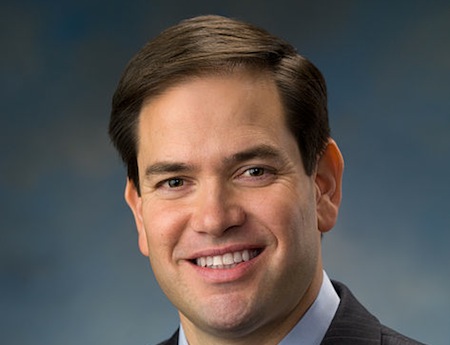Rubio Outlines Broad Wireless Broadband Plan

The smarter way to stay on top of broadcasting and cable industry. Sign up below
You are now subscribed
Your newsletter sign-up was successful
Sen. Marco Rubio (R-Fla.) June 11 outlined an ambitious agenda for spectrum reform, which includes plans to introduce three bills: The Wireless Innovation Act (which was introduced June 12) to free up government spectrum; a bill directing the FCC to conduct tests in the upper 5 GHz band and modify the rules to allow Wi-Fi so long as it doesn’t create harmful interference to vehicle-to-vehicle (V2V) communications; and a bill to promote wireless infrastructure.
Rubio, a member of the Senate Communications Subcommittee, said Wednesday that there were a lot of serious policy questions about advancements in high-speed wireless, but what was not debatable was that more spectrum was needed.
He said the government should not wait until the current FCC spectrum auctions are over before taking steps to free up more.
"Congress, the FCC, and the current Administration must continuously look to put spectrum to its best use and make it available to the private sector whenever possible," he said.
His Wireless Innovation Act:
• "Reallocates 200 MHz of government spectrum for commercial use;
• "Establishes an auction pipeline with staggered auctions starting in 2018;
The smarter way to stay on top of broadcasting and cable industry. Sign up below
• "Incentivizes federal agencies to reallocate spectrum by allowing portions of the proceeds to be used or conducting research and development, as well as cost and technical assessments on reallocating future spectrum bands;
• "Requires an analysis of requests for new or modified frequency assignments to determine whether a commercial service could be used, whether federal users can share; and
• "Requires [the National Telecommunications & Information Administration] to develop a framework to determine the commercial value of Federal spectrum."
He labeled the bill his "entrance" to the discussion about improving federal spectrum use.
His Wi-Fi bill will establish a timeline for the FCC to make a decision on Wi-Fi in the 5 GHz band, which cable operators have been pushing for. They already share the band, and cable ops have been arguing that sharing will continue to be viable under the ramped-up intelligent vehicle services—like crash avoidance systems—increasingly being offered on new cars. Car makers want to make sure those systems are protected from interference.
"I'm concerned that if we leave government agencies to their own devices," said Rubio, "we'll be in exactly the same place a year from now. That's not good enough. There are a lot of smart people working on this issue. Let’s get them together and work it out. Let’s engineer a solution."
The FCC already voted in March to loosen rules to allow for unlicensed Wi-Fi use of lower 5 GHz band for things like cable hot-spots. But a decision on the upper portion of the band is still awaiting a decision on how it could affect those incumbent V2V communications.
Rubio says the twin goals of more federal spectrum and more unlicensed Wireless spectrum for Wi-Fi will hinge on more wireless infrastructure, hence his third bill to boost infrastructure. "Government at all levels should not be a barrier to deployment. Confusing statutes and outdated local rules and regulations should not stand in the way of deploying infrastructure or modifying wireless facilities," he said.
It will be a tough ask to get any of that legislation passed as legislators turn their attention to trying to get themselves re-elected in the fall. But Rubio was getting plenty of kudos from the wireless companies his bill would benefit.
Not surprisingly, Jonathan Adelstein, president of PCIA, the wireless infrastructure association and a former FCC commissioner, was pleased with a bill promoting infrastructure.
“With today’s announcement, Senator Rubio is demonstrating urgently needed leadership in fostering innovation and helping to meet consumers’ burgeoning demand for wireless data," he said. "Senator Rubio places his name atop a growing list of policymakers that support clearing hurdles to deployment of wireless broadband... His proposed legislation would eliminate unnecessary hurdles that slow the delivery of broadband services to the public,” said Adelstein.
CTIA-The Wireless Association VP, government affairs, Jot Carpenter called it "forward-looking spectrum policy" that will "encourage investment and economic growth, while helping the wireless industry to stay ahead of consumers’ continued demand for mobile broadband.”
Contributing editor John Eggerton has been an editor and/or writer on media regulation, legislation and policy for over four decades, including covering the FCC, FTC, Congress, the major media trade associations, and the federal courts. In addition to Multichannel News and Broadcasting + Cable, his work has appeared in Radio World, TV Technology, TV Fax, This Week in Consumer Electronics, Variety and the Encyclopedia Britannica.

